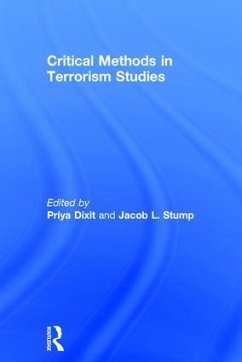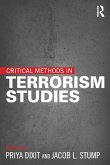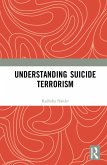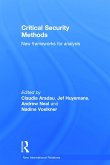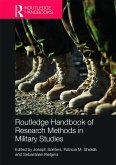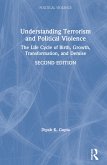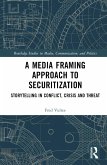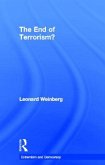- Gebundenes Buch
- Merkliste
- Auf die Merkliste
- Bewerten Bewerten
- Teilen
- Produkt teilen
- Produkterinnerung
- Produkterinnerung
This book shows how to use a range of critical methodological approaches to do research on terrorism, including discourse analysis, feminism, postcolonial studies, ethnography, critical theory and visual analysis.
Andere Kunden interessierten sich auch für
![Critical Methods in Terrorism Studies Critical Methods in Terrorism Studies]() Priya DixitCritical Methods in Terrorism Studies62,99 €
Priya DixitCritical Methods in Terrorism Studies62,99 €![Understanding Suicide Terrorism Understanding Suicide Terrorism]() Radhika HalderUnderstanding Suicide Terrorism180,99 €
Radhika HalderUnderstanding Suicide Terrorism180,99 €![Critical Security Methods Critical Security Methods]() Critical Security Methods181,99 €
Critical Security Methods181,99 €![Routledge Handbook of Research Methods in Military Studies Routledge Handbook of Research Methods in Military Studies]() Routledge Handbook of Research Methods in Military Studies276,99 €
Routledge Handbook of Research Methods in Military Studies276,99 €![Understanding Terrorism and Political Violence Understanding Terrorism and Political Violence]() Dipak K. GuptaUnderstanding Terrorism and Political Violence181,99 €
Dipak K. GuptaUnderstanding Terrorism and Political Violence181,99 €![A Media Framing Approach to Securitization A Media Framing Approach to Securitization]() Fred VulteeA Media Framing Approach to Securitization153,99 €
Fred VulteeA Media Framing Approach to Securitization153,99 €![The End of Terrorism? The End of Terrorism?]() Leonard WeinbergThe End of Terrorism?176,99 €
Leonard WeinbergThe End of Terrorism?176,99 €-
-
-
This book shows how to use a range of critical methodological approaches to do research on terrorism, including discourse analysis, feminism, postcolonial studies, ethnography, critical theory and visual analysis.
Produktdetails
- Produktdetails
- Verlag: Taylor & Francis
- Seitenzahl: 216
- Erscheinungstermin: 21. Juli 2015
- Englisch
- Abmessung: 234mm x 156mm x 14mm
- Gewicht: 485g
- ISBN-13: 9781138018716
- ISBN-10: 1138018716
- Artikelnr.: 41124295
- Herstellerkennzeichnung
- Libri GmbH
- Europaallee 1
- 36244 Bad Hersfeld
- gpsr@libri.de
- Verlag: Taylor & Francis
- Seitenzahl: 216
- Erscheinungstermin: 21. Juli 2015
- Englisch
- Abmessung: 234mm x 156mm x 14mm
- Gewicht: 485g
- ISBN-13: 9781138018716
- ISBN-10: 1138018716
- Artikelnr.: 41124295
- Herstellerkennzeichnung
- Libri GmbH
- Europaallee 1
- 36244 Bad Hersfeld
- gpsr@libri.de
Priya Dixit is assistant professor at the Department of Political Science, Virginia Tech, USA. Jacob L. Stump is assistant professor of political science at Shepherd University, USA.
1. Introduction, Jacob Stump and Priya Dixit 2. Reading Documents in their
Wider Context: Foucauldian and Realist Approaches to Terrorism Discourse,
Jonathan Joseph 3. Applying Marxism to Critical Terrorism Studies: Analysis
Through a Historical Materialist Lens, David Maher and Andrew Thomson 4.
Terrorists as Co-Participants? Outline of a Research Model, Harmonie Toros
5. Ecologizing "Terrorism": Attending to Emergent Pathways of Ethnographic
Fieldwork, Writing and Analysis, Yamuna Sangarasivam 6. Critical Discourse
Analysis, Richard Jackson 7. Metaphor Analysis as a Method in Terrorism
Studies, Alexander Spencer 8. Terrorism: Knowledge, Power, Subjectivity,
Verena Erlenbusch 9. 'Why Does the World Think We Are the Terrorists? We
Are Not the Terrorists!' Using a Reflexive Postcolonial Methodology in the
West Bank of the Palestinian Territories, Caitlin Ryan 10. Marginality as a
Feminist Research Method in Terrorism and Counter-Terrorism Studies,
Katherine Brown 11. Talking about Revolution: Ex-militant Testimony and
Conditions of 'Tell-ability', Charlotte Heath-Kelly 12. Visualizing Others:
A Conversation with Cynthia Weber on Films and Visuality in the "War on
Terror", Cynthia Weber (with Priya Dixit) 13. Falling Bodies: Confronting
the Iconography of Terror, Francois Debrix Conclusion, Priya Dixit and
Jacob Stump
Wider Context: Foucauldian and Realist Approaches to Terrorism Discourse,
Jonathan Joseph 3. Applying Marxism to Critical Terrorism Studies: Analysis
Through a Historical Materialist Lens, David Maher and Andrew Thomson 4.
Terrorists as Co-Participants? Outline of a Research Model, Harmonie Toros
5. Ecologizing "Terrorism": Attending to Emergent Pathways of Ethnographic
Fieldwork, Writing and Analysis, Yamuna Sangarasivam 6. Critical Discourse
Analysis, Richard Jackson 7. Metaphor Analysis as a Method in Terrorism
Studies, Alexander Spencer 8. Terrorism: Knowledge, Power, Subjectivity,
Verena Erlenbusch 9. 'Why Does the World Think We Are the Terrorists? We
Are Not the Terrorists!' Using a Reflexive Postcolonial Methodology in the
West Bank of the Palestinian Territories, Caitlin Ryan 10. Marginality as a
Feminist Research Method in Terrorism and Counter-Terrorism Studies,
Katherine Brown 11. Talking about Revolution: Ex-militant Testimony and
Conditions of 'Tell-ability', Charlotte Heath-Kelly 12. Visualizing Others:
A Conversation with Cynthia Weber on Films and Visuality in the "War on
Terror", Cynthia Weber (with Priya Dixit) 13. Falling Bodies: Confronting
the Iconography of Terror, Francois Debrix Conclusion, Priya Dixit and
Jacob Stump
1. Introduction, Jacob Stump and Priya Dixit 2. Reading Documents in their Wider Context: Foucauldian and Realist Approaches to Terrorism Discourse, Jonathan Joseph 3. Applying Marxism to Critical Terrorism Studies: Analysis Through a Historical Materialist Lens, David Maher and Andrew Thomson 4. Terrorists as Co-Participants? Outline of a Research Model, Harmonie Toros 5. Ecologizing "Terrorism": Attending to Emergent Pathways of Ethnographic Fieldwork, Writing and Analysis, Yamuna Sangarasivam 6. Critical Discourse Analysis, Richard Jackson 7. Metaphor Analysis as a Method in Terrorism Studies, Alexander Spencer 8. Terrorism: Knowledge, Power, Subjectivity, Verena Erlenbusch 9. 'Why Does the World Think We Are the Terrorists? We Are Not the Terrorists!' Using a Reflexive Postcolonial Methodology in the West Bank of the Palestinian Territories, Caitlin Ryan 10. Marginality as a Feminist Research Method in Terrorism and Counter-Terrorism Studies, Katherine Brown 11. Talking about Revolution: Ex-militant Testimony and Conditions of 'Tell-ability', Charlotte Heath-Kelly 12. Visualizing Others: A Conversation with Cynthia Weber on Films and Visuality in the "War on Terror", Cynthia Weber (with Priya Dixit) 13. Falling Bodies: Confronting the Iconography of Terror, Francois Debrix Conclusion, Priya Dixit and Jacob Stump
1. Introduction, Jacob Stump and Priya Dixit 2. Reading Documents in their
Wider Context: Foucauldian and Realist Approaches to Terrorism Discourse,
Jonathan Joseph 3. Applying Marxism to Critical Terrorism Studies: Analysis
Through a Historical Materialist Lens, David Maher and Andrew Thomson 4.
Terrorists as Co-Participants? Outline of a Research Model, Harmonie Toros
5. Ecologizing "Terrorism": Attending to Emergent Pathways of Ethnographic
Fieldwork, Writing and Analysis, Yamuna Sangarasivam 6. Critical Discourse
Analysis, Richard Jackson 7. Metaphor Analysis as a Method in Terrorism
Studies, Alexander Spencer 8. Terrorism: Knowledge, Power, Subjectivity,
Verena Erlenbusch 9. 'Why Does the World Think We Are the Terrorists? We
Are Not the Terrorists!' Using a Reflexive Postcolonial Methodology in the
West Bank of the Palestinian Territories, Caitlin Ryan 10. Marginality as a
Feminist Research Method in Terrorism and Counter-Terrorism Studies,
Katherine Brown 11. Talking about Revolution: Ex-militant Testimony and
Conditions of 'Tell-ability', Charlotte Heath-Kelly 12. Visualizing Others:
A Conversation with Cynthia Weber on Films and Visuality in the "War on
Terror", Cynthia Weber (with Priya Dixit) 13. Falling Bodies: Confronting
the Iconography of Terror, Francois Debrix Conclusion, Priya Dixit and
Jacob Stump
Wider Context: Foucauldian and Realist Approaches to Terrorism Discourse,
Jonathan Joseph 3. Applying Marxism to Critical Terrorism Studies: Analysis
Through a Historical Materialist Lens, David Maher and Andrew Thomson 4.
Terrorists as Co-Participants? Outline of a Research Model, Harmonie Toros
5. Ecologizing "Terrorism": Attending to Emergent Pathways of Ethnographic
Fieldwork, Writing and Analysis, Yamuna Sangarasivam 6. Critical Discourse
Analysis, Richard Jackson 7. Metaphor Analysis as a Method in Terrorism
Studies, Alexander Spencer 8. Terrorism: Knowledge, Power, Subjectivity,
Verena Erlenbusch 9. 'Why Does the World Think We Are the Terrorists? We
Are Not the Terrorists!' Using a Reflexive Postcolonial Methodology in the
West Bank of the Palestinian Territories, Caitlin Ryan 10. Marginality as a
Feminist Research Method in Terrorism and Counter-Terrorism Studies,
Katherine Brown 11. Talking about Revolution: Ex-militant Testimony and
Conditions of 'Tell-ability', Charlotte Heath-Kelly 12. Visualizing Others:
A Conversation with Cynthia Weber on Films and Visuality in the "War on
Terror", Cynthia Weber (with Priya Dixit) 13. Falling Bodies: Confronting
the Iconography of Terror, Francois Debrix Conclusion, Priya Dixit and
Jacob Stump
1. Introduction, Jacob Stump and Priya Dixit 2. Reading Documents in their Wider Context: Foucauldian and Realist Approaches to Terrorism Discourse, Jonathan Joseph 3. Applying Marxism to Critical Terrorism Studies: Analysis Through a Historical Materialist Lens, David Maher and Andrew Thomson 4. Terrorists as Co-Participants? Outline of a Research Model, Harmonie Toros 5. Ecologizing "Terrorism": Attending to Emergent Pathways of Ethnographic Fieldwork, Writing and Analysis, Yamuna Sangarasivam 6. Critical Discourse Analysis, Richard Jackson 7. Metaphor Analysis as a Method in Terrorism Studies, Alexander Spencer 8. Terrorism: Knowledge, Power, Subjectivity, Verena Erlenbusch 9. 'Why Does the World Think We Are the Terrorists? We Are Not the Terrorists!' Using a Reflexive Postcolonial Methodology in the West Bank of the Palestinian Territories, Caitlin Ryan 10. Marginality as a Feminist Research Method in Terrorism and Counter-Terrorism Studies, Katherine Brown 11. Talking about Revolution: Ex-militant Testimony and Conditions of 'Tell-ability', Charlotte Heath-Kelly 12. Visualizing Others: A Conversation with Cynthia Weber on Films and Visuality in the "War on Terror", Cynthia Weber (with Priya Dixit) 13. Falling Bodies: Confronting the Iconography of Terror, Francois Debrix Conclusion, Priya Dixit and Jacob Stump

